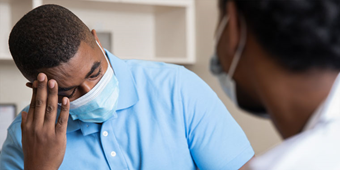Busting a Polar Vortex Myth

Find Your Perfect Match
Answer a few questions and we'll provide you with a list of primary care providers that best fit your needs.
The season’s first polar vortex is causing shivers throughout our region. Does that mean you can plan on coughing and sneezing your way through the coming holidays? Premier Health Now asked family physician Joseph Allen, MD, Family Medicine of Vandalia, about the health effects of a big drop in temperature. “Does the cold cause colds?” we asked.
“Colds are viruses,” Dr. Allen tells us. “You catch a cold by coming into contact with germs; it’s got nothing to do with the weather.” So although it’s smart to bundle up when the temperature plummets, if you want to avoid getting sick, Dr. Allen suggests you:
- Stay away from people who are sick, especially in tight quarters like crowded shopping malls, the bus or the office. “And if you’re sick, stay home from work so you don’t spread germs to your co-workers,” Dr. Allen advises.
- Protect yourself from germs by washing your hands often, and by getting vaccinated. “It’s been a mild flu season so far, but that doesn’t mean you should skip the flu vaccine,” says Dr. Allen. Also consider getting the pneumonia vaccine using these guidelines by the Centers for Disease Control and Prevention.
- Knowing when you’re sick enough to see the doctor can be tricky. Dr. Allen suggests you trust your instincts. “If you or your child are having trouble keeping fluids down, or you’re worried, give your primary care physician a call.”
Find Your Perfect Match
Answer a few questions and we'll provide you with a list of primary care providers that best fit your needs.
Source: Centers for Disease Control and Prevention; Joseph Allen, MD, Family Medicine of Vandalia





